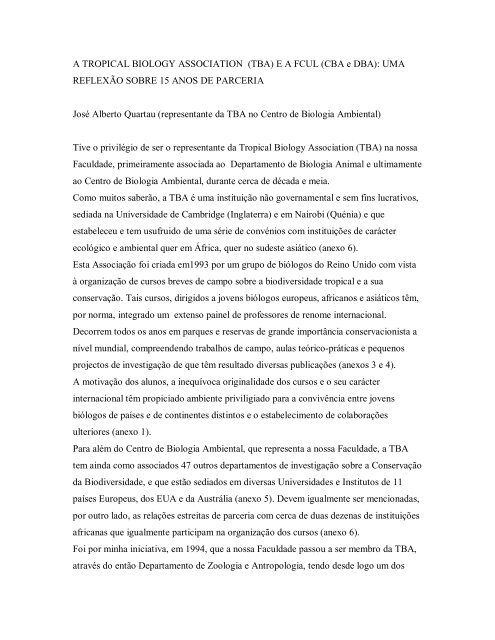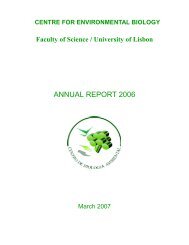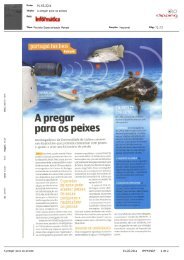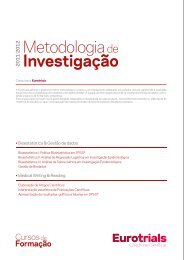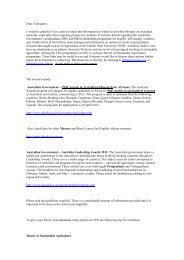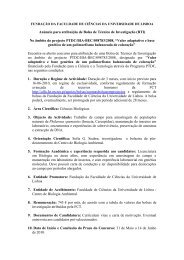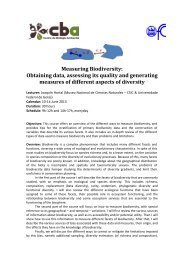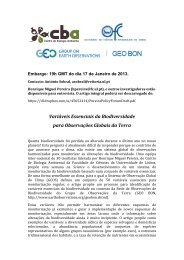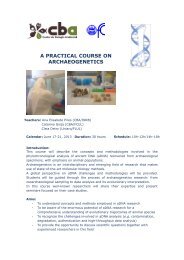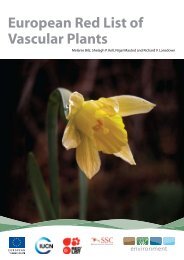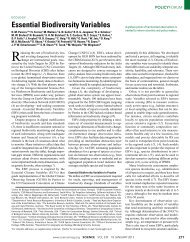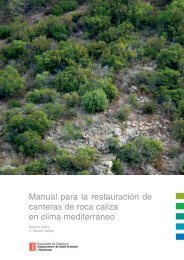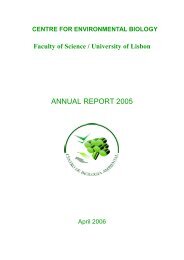A TBA EM PORTUGAL - Centro de Biologia Ambiental
A TBA EM PORTUGAL - Centro de Biologia Ambiental
A TBA EM PORTUGAL - Centro de Biologia Ambiental
You also want an ePaper? Increase the reach of your titles
YUMPU automatically turns print PDFs into web optimized ePapers that Google loves.
A TROPICAL BIOLOGY ASSOCIATION (<strong>TBA</strong>) E A FCUL (CBA e DBA): UMA<br />
REFLEXÃO SOBRE 15 ANOS DE PARCERIA<br />
José Alberto Quartau (representante da <strong>TBA</strong> no <strong>Centro</strong> <strong>de</strong> <strong>Biologia</strong> <strong>Ambiental</strong>)<br />
Tive o privilégio <strong>de</strong> ser o representante da Tropical Biology Association (<strong>TBA</strong>) na nossa<br />
Faculda<strong>de</strong>, primeiramente associada ao Departamento <strong>de</strong> <strong>Biologia</strong> Animal e ultimamente<br />
ao <strong>Centro</strong> <strong>de</strong> <strong>Biologia</strong> <strong>Ambiental</strong>, durante cerca <strong>de</strong> década e meia.<br />
Como muitos saberão, a <strong>TBA</strong> é uma instituição não governamental e sem fins lucrativos,<br />
sediada na Universida<strong>de</strong> <strong>de</strong> Cambridge (Inglaterra) e em Nairobi (Quénia) e que<br />
estabeleceu e tem usufruido <strong>de</strong> uma série <strong>de</strong> convénios com instituições <strong>de</strong> carácter<br />
ecológico e ambiental quer em África, quer no su<strong>de</strong>ste asiático (anexo 6).<br />
Esta Associação foi criada em1993 por um grupo <strong>de</strong> biólogos do Reino Unido com vista<br />
à organização <strong>de</strong> cursos breves <strong>de</strong> campo sobre a biodiversida<strong>de</strong> tropical e a sua<br />
conservação. Tais cursos, dirigidos a jovens biólogos europeus, africanos e asiáticos têm,<br />
por norma, integrado um extenso painel <strong>de</strong> professores <strong>de</strong> renome internacional.<br />
Decorrem todos os anos em parques e reservas <strong>de</strong> gran<strong>de</strong> importância conservacionista a<br />
nível mundial, compreen<strong>de</strong>ndo trabalhos <strong>de</strong> campo, aulas teórico-práticas e pequenos<br />
projectos <strong>de</strong> investigação <strong>de</strong> que têm resultado diversas publicações (anexos 3 e 4).<br />
A motivação dos alunos, a inequívoca originalida<strong>de</strong> dos cursos e o seu carácter<br />
internacional têm propiciado ambiente priviligiado para a convivência entre jovens<br />
biólogos <strong>de</strong> países e <strong>de</strong> continentes distintos e o estabelecimento <strong>de</strong> colaborações<br />
ulteriores (anexo 1).<br />
Para além do <strong>Centro</strong> <strong>de</strong> <strong>Biologia</strong> <strong>Ambiental</strong>, que representa a nossa Faculda<strong>de</strong>, a <strong>TBA</strong><br />
tem ainda como associados 47 outros <strong>de</strong>partamentos <strong>de</strong> investigação sobre a Conservação<br />
da Biodiversida<strong>de</strong>, e que estão sediados em diversas Universida<strong>de</strong>s e Institutos <strong>de</strong> 11<br />
países Europeus, dos EUA e da Austrália (anexo 5). Devem igualmente ser mencionadas,<br />
por outro lado, as relações estreitas <strong>de</strong> parceria com cerca <strong>de</strong> duas <strong>de</strong>zenas <strong>de</strong> instituições<br />
africanas que igualmente participam na organização dos cursos (anexo 6).<br />
Foi por minha iniciativa, em 1994, que a nossa Faculda<strong>de</strong> passou a ser membro da <strong>TBA</strong>,<br />
através do então Departamento <strong>de</strong> Zoologia e Antropologia, tendo <strong>de</strong>s<strong>de</strong> logo um dos
nossos alunos finalistas sido seleccionado para frequentar um <strong>de</strong>sses cursos na reserva<br />
florestal <strong>de</strong> Kibale, no Uganda.<br />
Como principal “output” da nossa ligação à <strong>TBA</strong>, que durante gran<strong>de</strong> parte da sua<br />
existência nunca implicou qualquer <strong>de</strong>spesa para a FCUL, ressalta a formação através<br />
<strong>de</strong>sses cursos tropicais <strong>de</strong> mais <strong>de</strong> três <strong>de</strong>zenas <strong>de</strong> alunos da nossa Faculda<strong>de</strong> e que<br />
tiveram lugar em parques e reservas <strong>de</strong> países como o Uganda, a Tanzânia, Madagáscar e<br />
Bornéu (anexo 2). É gratificante saber que muitos <strong>de</strong>stes nossos alunos prosseguiram a<br />
sua formação na área da biodiversida<strong>de</strong> tropical com pós-graduações, nomeadamente<br />
doutoramentos, e que hoje se encontram a trabalhar em instituições <strong>de</strong> inequívoco mérito,<br />
nomeadamente da Holanda, <strong>de</strong> Inglaterra, da Espanha e da Costa Rica. Igualmente<br />
recompensador é o facto <strong>de</strong> ter sido através da <strong>TBA</strong> que estes nossos alunos tiveram o<br />
seu primeiro contacto com a magnificência e o esplendor dos ecossistemas tropicais.<br />
Praticamente todos, sem excepção, me haviam <strong>de</strong> confi<strong>de</strong>nciar que os cursos haviam<br />
ultrapassado as suas expectativas. Ainda neste particular, é pertinente transcrever as<br />
impressões do próprio Charles Darwin, quando pela primeira vez pisou uma floresta<br />
tropical, a 29 <strong>de</strong> Fevereiro <strong>de</strong> 1832: “Delight itself, however, is a weak term to express<br />
the feelings of a naturalist who, for the first time, has wan<strong>de</strong>red by himself in a Brazilian<br />
forest. The elegance of the grasses, the novelty of the parasitical plants, the beauty of the<br />
flowers, the glossy green of the foliage, but above all the general luxuriance of the<br />
vegetation, filled me with admiration” (In The Voyage of the Beagle).<br />
Po último, quero aproveitar o ensejo para agra<strong>de</strong>cer o apoio sempre prestado por<br />
sucessivos presi<strong>de</strong>ntes do Departamento <strong>de</strong> <strong>Biologia</strong> Animal e do nosso <strong>Centro</strong> e <strong>de</strong>sejar<br />
votos do maior êxito ao Professor Dr. Jorge Palmeirim, o nosso novo representante da<br />
<strong>TBA</strong>.<br />
Anexos: quadros 1-6.
Where are they now? 97% of our African alumni<br />
remain in contact with us and all but 2% of these<br />
remain in conservation‐related fields.<br />
Research<br />
10%<br />
PhD<br />
12%<br />
MSc<br />
22%<br />
Other<br />
5%<br />
BSc<br />
1%<br />
Dr Henry Ndangalasi (below left), a <strong>TBA</strong><br />
alumnus from 1995, returns to teach on the<br />
course at Amani Nature Reserve in 2008<br />
Making an impact . . .<br />
Lecturer or<br />
Teacher<br />
10%<br />
Conservation<br />
40%<br />
The STP workshop<br />
assisted me to get a<br />
very good job as<br />
through that<br />
workshop I gained<br />
confi<strong>de</strong>nce to a high<br />
extent particularly<br />
from my presentation.<br />
2005 workshop<br />
participant<br />
…an excellent opportunity to build on my network<br />
of people of different races and nationality,<br />
concerned and involved in biodiversity research and<br />
teaching.<br />
Ghanaian participant, Tanzania 2008<br />
Without exaggeration I have got a lot more<br />
knowledge from the <strong>TBA</strong> course than from my last 4<br />
years in the university.<br />
Course participant, Kenya 2007<br />
As an African, it ma<strong>de</strong> me proud to see African<br />
stu<strong>de</strong>nts excelling on an equal footing with their<br />
European counterparts.<br />
Swazi teacher on Uganda course 2009<br />
The most enjoyable aspects were the opportunity to work and<br />
discuss our i<strong>de</strong>as with completely different people from African and<br />
European countries, the contact with culture and people from<br />
Madagascar…<br />
Portuguese participant, Madagascar 2009<br />
The international nature of the course provi<strong>de</strong>d an excellent<br />
learning environment for the participants. They learned from<br />
instructors as well as each other. It was a super opportunity for all<br />
involved.<br />
Course teacher, Uganda 2006
Portuguese <strong>TBA</strong> alumni, 1994 – 2009<br />
Last Name First name Gen<strong>de</strong>r Course Current Institution Highest/current<br />
qualification<br />
Amaro Mateus Ana Rita Female 09/4 Kirindy Lei<strong>de</strong>n University, Netherlands PhD<br />
Bichao Maria Helena Female 94/1 Kibale BSc<br />
Carvalho Mariana Female 00/2 Amani MSc<br />
Coelho dos Santos Ana Margarida Female 02/4 Kirindy Imperial College London, UK PhD<br />
<strong>de</strong> Melo Alves Ana Female 06/2 Kibale University of Barcelona, Spain BSc<br />
Fernan<strong>de</strong>s Duarte Ana Leitão Female 03/1 Kibale University of Groningen, BSc<br />
Netherlands<br />
Ferreira Joana Female 08/3 Kirindy University of Lisbon BSc<br />
Flanagan Deirdre Female 06/1 Amani University of Lisbon BSc<br />
Gouveia Maldonado Cristina Female 09/1 Kibale University of Lisbon<br />
Lerias Rui Pedro Male 96/1 Kibale BSc<br />
Lourenço Pedro Male 01/2 Kibale University of Groningen, PhD<br />
Netherlands<br />
Lourenço Sofia Female 97/2 Kibale MSc<br />
Marques Ana Teresa Female 02/2 Kibale University of Lisbon MSc<br />
Marques João Male 99/3 Amani University of Lisbon PhD<br />
Matias Rafael Male 00/3 Amani BSc<br />
Mira Martins Bruno Male 09/3 Danum<br />
Novo Kaztenberger Marco Male 08/2 Kibale Estación Biologica <strong>de</strong> Doñana<br />
(EBD‐CSIC), Spain MSc<br />
O Belda<strong>de</strong> Patricia Female 95/3 Kibale Lei<strong>de</strong>n University, Netherlands PhD<br />
Palmeirin Ana Filipa Female 09/3 Danum<br />
Patricio Pedro Male 08/1 Amani University of Lisbon<br />
Pereira Miguel Male 01/1 Amani MSc<br />
Pires Marialva Marta Female 09/4 Kirindy Lei<strong>de</strong>n University, Netherlands<br />
Proença Vânia Female 03/4 Kirindy University of Lisbon PhD<br />
Reis Joaquim Male 98/2 Kibale Portuguese Institute for Nature<br />
Conservation PhD<br />
Rocha Ricardo Male 07/2 Mpala/<br />
Naivasha Imperial College London, UK BSc<br />
Rodrigues Joana Female 98/2 Kibale DICE, University of Kent, UK BSc<br />
Rosa Patricia Female 97/1 Kibale Portuguese Institute of Hygiene<br />
and Tropical Medicine PhD<br />
Simoes Ana Rita Female 06/4 Kirindy Universida<strong>de</strong> <strong>de</strong> Aveiro BSc<br />
Teixeira Martins Ana Rita Female 06/3 Mpala/<br />
Naivasha University of Lisbon BSc<br />
Trinda<strong>de</strong> Ana Female 99/2 Amani BSc<br />
Valente Luis Male 05/1 Kibale Madrid Botanic Gar<strong>de</strong>ns, Spain PhD<br />
Vasconcelos Raquel Campos Female 04/3 Kibale University of Lisbon PhD<br />
Velloso Miguel Male 95/3 Kibale MSc<br />
Verissimo Diogo Male 05/2 Kibale Global Vision International,<br />
Costa Rica MSc<br />
Verissimo Nuno Male 09/4 Kirindy Goettingen University, Germany MSc
Tropical Biology Association Publications, March 2010<br />
One of the outputs from <strong>TBA</strong> activities has been the <strong>de</strong>velopment of a series of practical gui<strong>de</strong>s to essential<br />
skills and introductions to the natural history of the sites where <strong>TBA</strong> courses are held. These inclu<strong>de</strong><br />
<strong>de</strong>tailed accounts of some of the flora and fauna encountered by participants on <strong>TBA</strong> field courses and<br />
instructional handbooks resulting from STP workshops.
Publications from <strong>TBA</strong> activities, March 2010<br />
Published papers are among the outcomes of <strong>TBA</strong>ʹs activities. Designing, carrying out and writing up<br />
research projects is an integral part of the <strong>TBA</strong> month‐long courses. Some stu<strong>de</strong>nts go on to get their<br />
papers published, as are some of the class exercises, while staff and teachers on the courses may collect<br />
data that they use in their own research publications. Other <strong>TBA</strong> activities, such as research<br />
collaborations, also result in publications.<br />
Abdallah, A. et al. (2004) Freshwater Forum 21:27‐47<br />
Coetzee, B. et al. (2008) African Journal of Ecology 46:449‐451<br />
Compton, S. G. et al. (2009) African Entomology 17:215‐222<br />
Corbin, C.E. & Kirika M.J. (2002) African Zoology 37:47‐54<br />
Dawson, W. et al. (2008) Biodiversity and Conservation 17:1979‐1995<br />
Dawson, W. et al. (2009) Biological Conservation 142:1018–1024<br />
Dawson, W. et al. (2009) Diversity and Distribution 15:141–147<br />
De Vries, P.J. (2002) Biotropica 34:176‐181<br />
De Vries, P.J. (2003) Journal of Lepidopteristsʹ Society 57:235‐238<br />
Dominy, N.J. et al. (2008) Annals of Botany 101:1363–1377<br />
Edward, E. et al. (2009) Biotropica 41(2):171‐178<br />
Fisher, B. et al. (2009) Oryx 43:361‐363<br />
Franks, N.R. et al. (1999) Proceedings of the Royal Society, Biological Sciences 266:1697‐1701<br />
Franzen, M. et al. (2009) Amphibia‐Reptilia 31:1‐11<br />
Garner, T.W.J. et al. (2008) Ethology 114:1006–1013<br />
Graw, B. et al. (2005) Entomologische Zeitschrift 115:211‐216<br />
Grubb, P.J. & Jackson, R.V. (2007) Plant Ecology 192:317–327<br />
Grubb, P.J. et al. (2008) Annals of Botany 101:1379–1389<br />
Jehle, R. & Arak, A. (1998) Bioacoustics 9:35‐48<br />
Lekunze, L. M. & Hassan, M.M. (2001) African Journal of Ecology 39:93‐97<br />
Lukasik, P. & Johnson, T. (2007) African Entomology 15:214–220<br />
Metcalfe, D.J. et al. (2007) African Journal of Ecology 45:464‐468<br />
Trevelyan, R. & Nuttman, C. (2008) Book chapter: In, Science and Conservation in African Forests<br />
Van Biervliet, O. et al. (2009) Biotropica 41:469‐475<br />
Willmer, P. et al. (2009) Current Biology 19:919‐923
Tropical Biology Association subscribing member institutions, February 2010<br />
AUSTRALIA<br />
School of Life and Environmental Sciences, Deakin<br />
University, Melbourne<br />
AUSTRIA<br />
Institute of Zoology, Karl‐Franzens University, Graz<br />
Institute of Ecology, University of Innsbruck<br />
Institute of Zoology, Paris‐Lodron University, Salzburg<br />
Faculty of Life Sciences, University of Vienna<br />
DENMARK<br />
Institute of Biological Sciences, University of Aarhus<br />
FRANCE<br />
Centre d’Étu<strong>de</strong>s Biologiques <strong>de</strong> Chizé, CNRS, Chizé<br />
GERMANY<br />
Department of Sociobiology, German Primate Centre,<br />
Gottingen<br />
Institute of Systematic Botany, University of Munich<br />
Department of Animal Ecology and Tropical Biology,<br />
University of Wurzburg<br />
IRELAND<br />
Department of Botany, National University of Ireland,<br />
Galway,<br />
Environmental Science Unit, National University of<br />
Ireland, Galway<br />
Department of Zoology, Trinity College Dublin<br />
School of Natural Sciences, Trinity College Dublin<br />
Department of Zoology, University College Dublin<br />
NETHERLANDS<br />
Community and Conservation Ecology, University of<br />
Groningen<br />
Institute of Biology, University of Lei<strong>de</strong>n<br />
Resource Ecology Group, Wageningen University and<br />
Research Centre<br />
POLAND<br />
Institute of Environmental Sciences, Jagiellonian<br />
University, Cracow<br />
Environmental Biology Departments, Warsaw University<br />
<strong>PORTUGAL</strong><br />
Centre for Environmental Biology, University of Lisbon<br />
SWEDEN<br />
Department of Biology, Gothenberg University<br />
Department of Ecology, Lund University<br />
Centre for Research and Natural Resources, and the<br />
Department of Systems Ecology, Stockholm University<br />
SWITZERLAND<br />
Swiss Tropical and Public Health Institute, Basel<br />
Department of Integrative Biology, University of Basel<br />
Department of Biology, University of Bern<br />
Department of Biology, Ecology and Evolution,<br />
University of Fribourg<br />
Department of Ecology and Evolution, University of<br />
Lausanne<br />
Institute for Integrative Biology, ETH Zurich<br />
Zoology Institute, University of Zurich<br />
UNITED KINGDOM<br />
School of Biological Sciences, University of Aber<strong>de</strong>en<br />
School of Biological Sciences, University of Bristol<br />
School of Applied Sciences, Anglia Ruskin University,<br />
Cambridge<br />
Department of Plant Sciences, University of Cambridge<br />
Department of Zoology, University of Cambridge<br />
Institute of Evolutionary Biology, University of<br />
Edinburgh<br />
School of Geosciences, University of Edinburgh<br />
Faculty of Biological Sciences Graduate School,<br />
University of Leeds<br />
School of Biological Sciences, University of Liverpool<br />
Department of Biology, University College London<br />
Institute of Zoology, Zoological Society of London<br />
School of Biology, University of Nottingham<br />
Department of Plant Sciences, University of Oxford<br />
Department of Zoology, University of Oxford<br />
School of Environment and Life Sciences, Salford<br />
University<br />
Department of Biological Sciences, Imperial College,<br />
Silwood Park<br />
School of Biology, University of St Andrews<br />
USA<br />
Faculty of Arts and Sciences, Yale University
Creating institutional links and building relationships<br />
The <strong>TBA</strong> works closely with universities, government <strong>de</strong>partments, NGOs and other organisations<br />
throughout Africa and in Malaysia. Long‐lasting collaboration ensures that critical skills gaps are<br />
i<strong>de</strong>ntified and addressed and un<strong>de</strong>rpins the enduring impact of <strong>TBA</strong> activities.<br />
Kenya<br />
Egerton University<br />
Kenya Wildlife Service<br />
Kenyatta University<br />
Moi University<br />
The National Museums of Kenya<br />
Nature Kenya<br />
Tanzania<br />
Amani Nature Reserve<br />
Tanzania Forestry Research Institute<br />
Forestry and Beekeeping Division of the Ministry of<br />
Nature Resources and Tourism<br />
Sokoine University of Agriculture<br />
Tanga Catchment Forestry (formerly East Usambara<br />
Catchment Management Project)<br />
Wildlife Conservation Society<br />
Borneo<br />
Danum Valley Field Centre<br />
The Royal Society South East Asia Rainforest Research<br />
Project<br />
Sabah Forestry Department<br />
Madagascar<br />
Centre National <strong>de</strong> Formation, dʹEtu<strong>de</strong>s et <strong>de</strong> Recherche<br />
en Environnement et Foresterie<br />
Faculty of Sciences, University of Antananarivo<br />
Ministre Eaux et Forets and Ministre <strong>de</strong> l’Environnement<br />
Peregrine Fund Project<br />
Uganda<br />
Makerere University Biological Field Station<br />
Makerere University Institute of Environment and<br />
Natural Resources<br />
Nature Uganda<br />
Uganda Wildlife Authority


